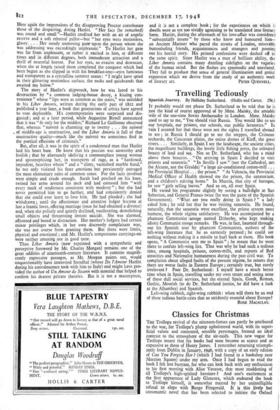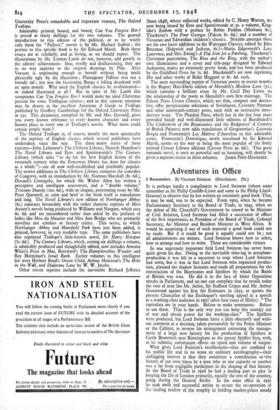Classics for Christmas
THE Trollope revival of the nineteen-forties can partly be attributed to the war, for Trollope's plump upholstered world, with its super- ficial values and contented, sensible personages, formed an ideal contrast to the atmosphere of the air-raids. This new vogue for Trollope meant that his books had soon become as scarce and as expensive as those of Henry James. I remember returning triumph- antly from Dublin in January, 1946, with a copy of an early edition of Can You Forgive Her ? (which I had found in a bookshop near Merrion Square) under my arm. Once I had begun to read the book I felt less buoyant, for who can look back with any enthusiasm to his first meeting with Alice Vavasor, that most maddening of all Trollope's high-spirited heroines ? And one's excitement at the first appearance of Lady Glencora, which endeared the book to Trollope himself, is somewhat marred by her unintelligible refusal to elope with Burgo Fitzgerald. It is this lively but unromantic novel that has been selected to initiate • the Oxford
University Press's remarkable and important venture, The Oxford Trollope.
Admirably printed, bound, and boxed, Can You Forgive Her? Is priced at thirty shillings for the two volumes. The general introduction to this edition of the political, or as he wisely calls them the "Palliser," novels is by Mr. Michael Sadleir ; the preface to this specific book is by Sir Edward Marsh. Both these essays are as scholarly, and as 'loving, as we should expect. The illustrations by Mr. .Lynton Lamb do not, however, add greatly to the editors' achievement : blue, woolly and disillusioning, they are in no way superior to the original drawings by Phiz. Alice Vavasor is unpleasing .,enough in herself without being made physically ugly by the illustrator ; Plantagenet Palliser was not a tweedy oaf ; nor was the fascinating Burgo a lolling drunkard with an open mouth. Why need the English classics be re-illustrated- or indeed illustrated at all ? But in spite of Mr. Lamb this sumptuous Can You Forgive Her ? would makellin ideal Christmas present for some Trollopian relative ; and in thii context attention may be drawn to the excellent American A Guide to Trollope published by Geoffrey Cumberlege for the Oxford University Press at 258. This dictionary, compiled by Mr. and Mrs. Gerould, gives you every known reference to every known character and every known place in every one of Trollope's novels. What more could certain people want ?
The Oxford Trollope is, of course, merely the most spectacular of the reprints of English classics which several publishers have undertaken since the war. The three major series of these reprints—John Lehmarufs The Chiltern Library, Hamish Hamilton's The Novel Library and Eyrc and Spottiswoode's The Century Library (which aims "to do for the best English fiction of the twentieth century what the Everyman library has done for classics as a whole ")—are all now well-established and justifiably. popular. The newest additions to The Chiltern Library comprise the comedies of Congreve, with an introduction by Mr. Norman Marshall (8s. 6d.), Disraeli's Coningsby, for which Mr. Walter Allen has written a perceptive and intelligent assessment, and a "double volume ”' Tristram Shandy (xos. 6d.), with an elegant, penetrating essay by dr. Peter Quennell, as calm and brief as the book itself is tumultuous and long. The Novel Library's new edition of Northanger Abbey (6s.) contrasts favourably with the rather clumsier reprints of Miss Austen's novels being produced by Williams and Norgate, which cost 8s. 6d. and are encumbered rather than aided by the prefaces of ladies like Miss du Maurier and Miss Ann Bridge who are primarily novelists not scholars or literary critics. This series, to which Northanger Abbey and Mansfield Park have just been . added, is printed, however, in very readable type. The same publishers have also reprinted Trollope's little-known novel, Sir Harry Hotspur (7s. 6d.). The Century Library, which, costing six shillings a volume, is admirably produced and thoughtfully edited, now includes Antonia White's Frost in May, Beresford's The. Hampdenshire Wonder and Roy Homiman's Israel Rank. Earlier volumes in this intelligent list were Herbert Read's Green Child, Arthur Morrison's The Hole in the Wall, and Dialstone Lane by W. W. Jacobs.
Other recent reprints include the inevitable Richard Jefferies
(born I1348)? whose collected works, edited by C. Henry Warren, are now being issued by Eyre and Spottiswoode at 55. a volume, King- lake's Eothen with a preface by Robin Fedden (Methuen 6s.), Thackeray's The Four Georges (Falcon 8s. 6d.) and a number of Victorian and Edwardian children's classics. Notable amongst these are the two latest additions to the Watergate Classic; edited by John Betjeman (SidgwicIC and Jackson, 6s.)—Maria. Edgeworth's Lazy Lawrence, and Mrs. Evving's A Flat Iron for a Farthing. Thackeray's Christmas pantomime, The Rose and the Ring, with the author's own illustrations and a cover and title-page designed by Edward Ardizzone, makes an extremely pretty book, and has been produced by the Guildford Press for 75. 6d. MacdonaM's are now reprinting She and other works of Rider Haggard at 8s. 6d. each.
The most outstAnding reprint of Victorian poetry in recent months is the Rupert Hart-Davis edition of Meredith's Modern Love (5s.), which contains a brilliant essay by Mr. Cecil Day Lewis on the relationship of the poem to Meredith's own first marriage. The Falcon Press Crown Classics, which are thin, compact and decora- tive, offer perspicacious selections of Swinburne, Coventry Patmore and other nineteenth-century poets, each with an instructive intro- ductory essay. The Phaidon Press which has in the last four years provided handy and well-illustrated little• editions of Burckhardes The Civilization of the Renaissance and the Redgraves' A Century of British. Painters, now adds translations of Gregorovius's Lucrezia Borgia and Fromentin's Les Mahres d'Autrefois to this admirable series. Fromentin's Dominique, newly translated by Sir Vdward Marsh, seems on the way to being the most popular of the finely printed Cre.sset Library editions (Cresset Press 98. 6d.). This great romantic novel, at once so powerful and so haunting, will shortly be given a separate notice in these columns. JAMES POPE-HENNESSY.'



































 Previous page
Previous page